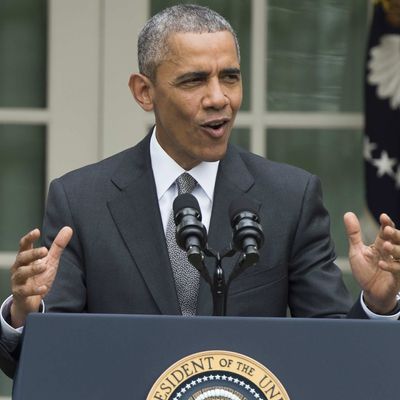
In his remarks at the White House today hailing the Supreme Court’s denial of a right-wing nuisance lawsuit designed to cripple his health-care law, President Obama mused over why the public did not overwhelmingly approve of it. After all, the law is not only working as intended, but in some of the most crucial metrics — premium levels, federal budget costs — it is working considerably better than projected. Yet public approval has remained mediocre. The president settled on the fact that there are people benefiting from the law and they don’t even know it. There’s no card that says Obamacare.
But there is another possible explanation. The law’s critics have consistently presented a much louder and more certain attack, and its supporters a more cautious and muted defense, and this has remained the case even though, on virtually every point, the critics have been wrong and the supporters right.
Here is a small example of a dynamic that has repeated itself innumerable times in the five years since the Affordable Care Act passed. Every year, conservatives have proclaimed that premiums on the Obamacare exchanges would skyrocket to unaffordable levels, setting off a death spiral of fleeing consumers that would ultimately bring about the law’s demise. Starting in 2013, the year the exchanges went online, critics predicted “double-digit premium increases.”
That didn’t happen, but critics of the law insisted that insurers were simply offering low teaser rates to attract customers. In 2014, rates would skyrocket. That also didn’t happen. But in 2015, critics insisted, no seriously, this time there really would be gigantic spikes in premiums. In every case, the wave of scare stories was based on a handful of anecdotes — one insurance company here, a handful of firms there, rather than assessing the entire market. “Health insurers are proposing to raise Obamacare rates more than in the past — some by more than 70 percent — now that they are finally equipped with all the information they need to price those plans,” blared the lead in a story earlier this month in the Washington Examiner.
Yesterday, the Kaiser Family Foundation surveyed projected premiums in 11 major cities. The average benchmark premium is expected to rise 4.4 percent next year. That is a bit more than the historically low growth of recent years, but it is still quite low by historical standards. (It’s half the rate of premium increases in the individual market in the years before Obamacare.) And it’s nowhere near the shocking, skyrocketing figures that conservatives had confidently bandied about.
Yet Republicans have simply gone on repeating their previous claims as though they were true. “Many of the proposed increases are eye-poppingly huge,” cried Republican representative Peter Roskam. “The creation of an almost trillion-dollar federal government subsidy program has done little to mask the impact of Obamacare’s biggest failure — skyrocketing premiums,” said Republican Senator Orrin Hatch. There is apparently no cost whatsoever for Republicans repeating false claims about Obamacare. Every failed prediction of doom has simply been repeated anyway, until a new prediction of doom can be offered.
It is entirely possible that the same echo-chamber effect helped persuade the news media to treat the latest Obamacare lawsuit with far more seriousness than it deserved. As several legal analysts have explained, the merits of the lawsuit are simply open and shut. To win the lawsuit, opponents must prove that Congress unambiguously wrote the law to deny tax credits to federal exchanges — a conclusion that not only is not unambiguously true, it’s clearly wrong and was actively disbelieved by everybody involved with the law, in both parties, until the a handful of right-wing lawyers concocted the theory after the fact. Why would the court take this lawsuit seriously, when it had already passed up on a chance to strike down Obamacare?
There was a chance, sure, because you never know. But the conservative movement created a sense of momentum and seriousness by treating the lawsuit not only as a possible long-shot attack on the law but a fait accompli. Just the other day, Paul Ryan, in a New York Times interview, invoked the lawsuit as if his side had already prevailed:
“This is the beginning of the end of the Affordable Care Act,” Representative Paul Ryan of Wisconsin, the chairman of the House Ways and Means Committee, said in an interview.
“The key is to get into 2017,” Mr. Ryan said. “That’s why the court ruling is so devastating to him. It will expose this law, and make it certain that Congress will be rewriting this law fully once he’s gone.” …
“I think they cut corners trying to get this bill into law,” Mr. Ryan said. “Those chickens are coming home to roost.” If the court rules against Mr. Obama, he added, “I think it’s a huge blow to his efforts to create a legacy.”
It turns out to be yet another confident prediction of doom that didn’t happen. And now, if Ryan wants to pursue his dream of snatching insurance away from millions of people who are too sick or poor to afford it on their own, he’ll have to win an election and pass a law.






























